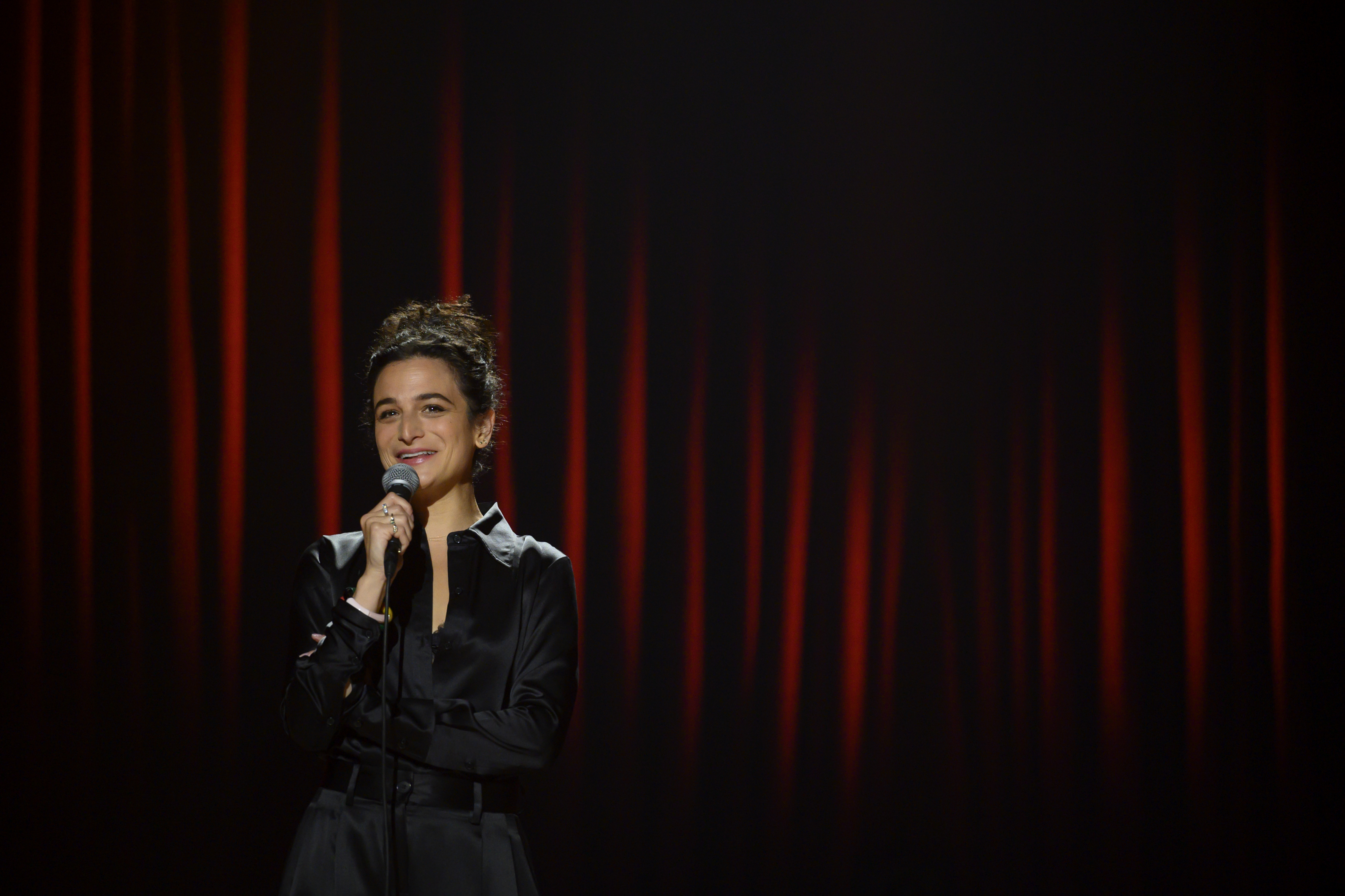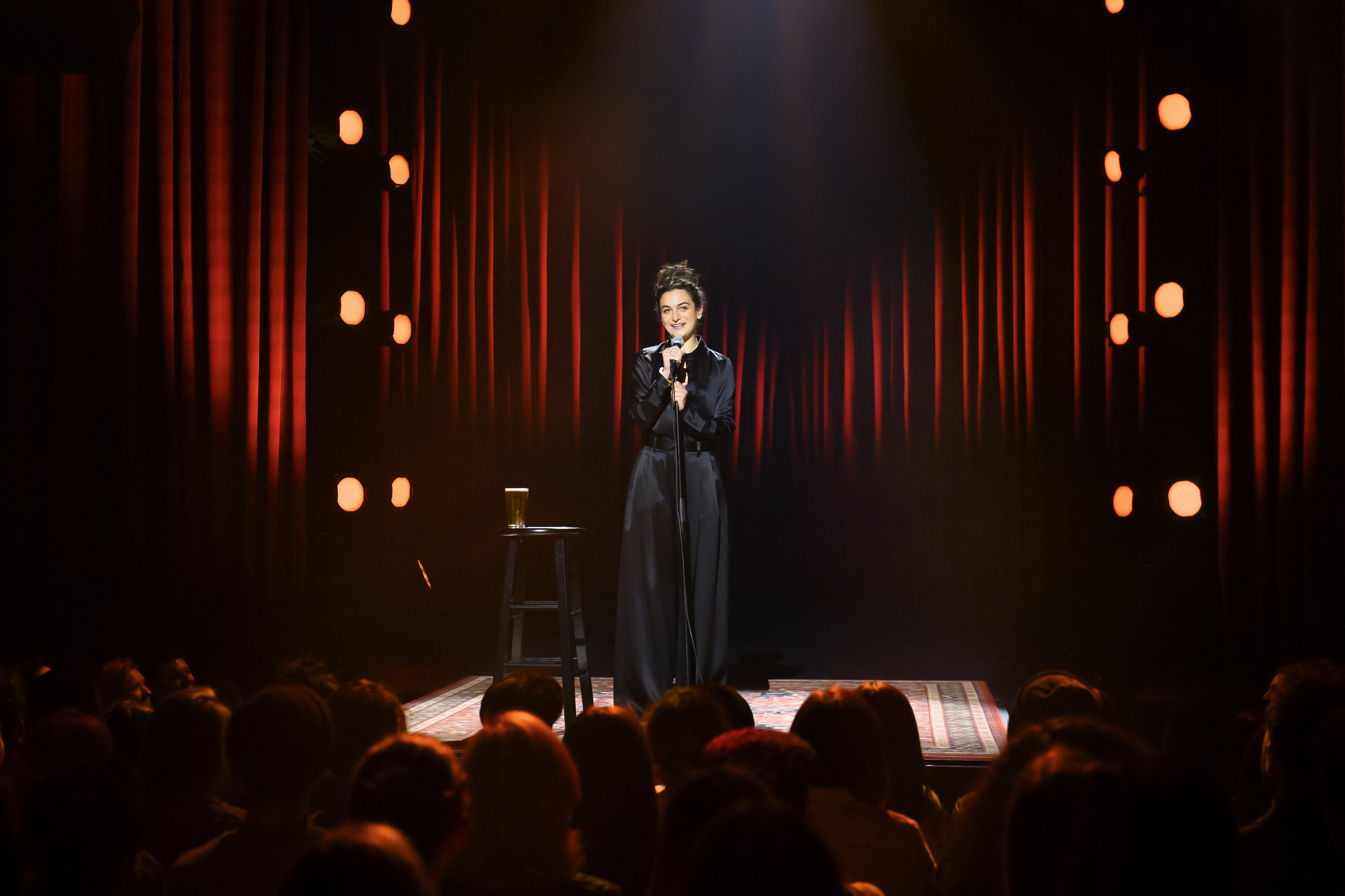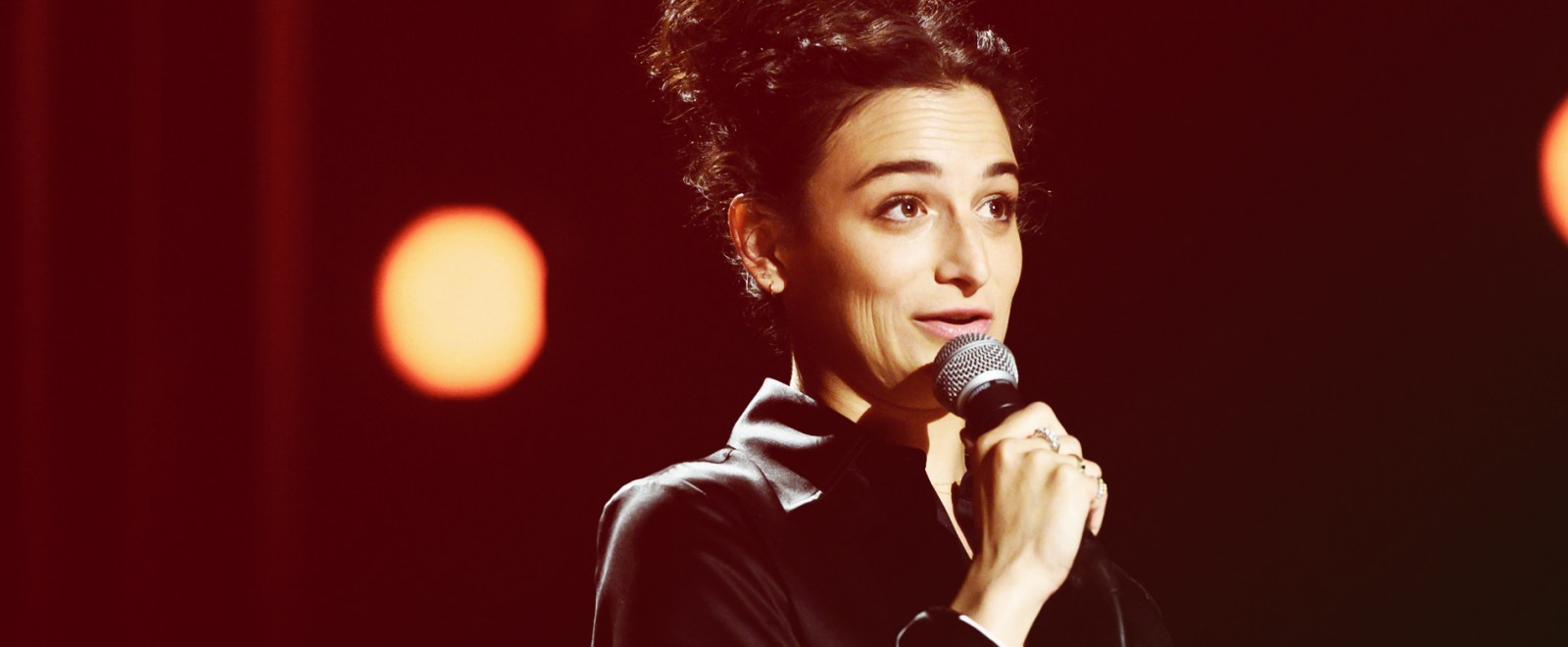In her new Netflix comedy special, Stage Fright, Jenny Slate blends a revelatory family documentary with confessionals and a freeform stand-up act in a team-up with Gillian Robespierre, her Obvious Child and Landline collaborator, that feels charming, interesting, hilarious, and utterly unique all at the same time. It’s also open, relatable, and in checking those boxes, conveys a sense of authenticity that Slate is chasing as a performer and a person. It’s something we discussed recently with the actress and comedian who is best known for her work in the above-mentioned films, Park and Rec, and Big Mouth.
Across our conversation, Slate also offered insightful, no-bullshit takes on her past apprehensions about doing a comedy special, evading formulas, resisting nostalgia, and how the special serves as an emotional time capsule.
Hey, you know what? I needed that special. I was telling a friend the other day how I had not seen a really great comedy special in a while and I was just a bit exhausted by all the kinda bro-y stuff and this was perfect. Like really refreshing.
Wow! That means so much to me. I wasn’t expecting that. Thank you. It’s so funny. The reason why I didn’t make a special for a long time was that I was like, this is so prescriptive. It just feels like everybody does it in the same way and it does feel bro-y and how many hoops am I going to have to jump through just to get a special? Like blah, blah, blah. That actually is not how it went down for me at all. In fact, it was a lesson learned that I should continue to have the optimistic attitude that I normally have. But when I made the special, I wasn’t sure whether or not people were going to be like, “Yes, this is a comedy special” or whether or not it would just seem like an in memoriam. [Laughs]
In fact, I wanted to call it In Memoriam and everyone kept saying, like, “You need to just stop acting like somebody is doing you a huge favor. You have a space to fill, like, do your work. You’ve been doing it for so long, why not make it legit?” I’m glad that I did.
I read somewhere that you really had no interest in filming a special, so I was curious, beyond what you just said, what was it that changed your mind?
Well, first of all, it did used to seem to me that, before Netflix existed and was making this content, what I would hear from my friends about what they had to go through to get a Comedy Central special or whatever… that didn’t seem fun. That just doesn’t seem fun. Also, the idea that it would be like once you do your special, you can’t do those jokes again. You have to come up with new things or people would tour over and over again in order to get everything right to do the special. That just did not seem fun to me. I’ve always done stand-up… except for at Largo in LA, I’ve basically done it for free. Occasionally, I’ll go to a college or do a festival, but I mostly do small shows because that’s what I prefer. Because I feel that I can be creatively authentic.
I am not a joke writer. My comedy is relational and experiential and it’s like going out to dinner with somebody. It’s free form on purpose because I make myself laugh when I make comedy. It’s for me as well. I didn’t understand that there could be a space for that. But then when I saw my friends doing specials for Netflix and it was like, “Oh, well hold on, like Kroll and Mulaney are doing Oh, Hello and people are being really original.” I felt like maybe I can do my thing. That also coincided with a time when I was starting to tour a little bit and doing festivals. I would do like Moontower or something in Austin and play the Paramount and play the Wilbur in Boston and play 1,200 people, which is the max for what I will perform for.
Anyway, I asked Netflix, “Can I do an hour and interview my family, so that I feel like people really get a sense, just a little taste, of where I come from and they can understand that I’m not getting on stage and just saying something that I could say to anyone, but that I’m saying it that night based on who I perceive the group to be?” They were like, “Yeah, sure.” I was like, “Wait. What?” I was like, “Okay. I want to choose my director and have an all-female crew,” and they were like, “Yeah. Alright. Okay.” It was just like, I’m expecting someone to be like, “You can’t do that.” They put no limits on me, which was really nice.

The aspect of your childhood home getting sold during filming, is that something that was a part of this from the start or was that something where the timing worked out? Because it adds a layer, obviously.
Yeah, it was. I wanted to be careful about not making it a huge thing just because it’s like, “Oh boohoo, you’re 37 years old and your parents are selling their house.” It’s almost none of your business, you know? What a privilege to even be able to grow up in a place like this. Like, get over it. There’s a lot. It’s not that relatable.
Yeah, but it still has an impact. Honestly, I’m about to move out of the house that I’ve lived in for 15 years and I moved like 20 times before that. That’s the only place where I’ve lived for a long time, so it was highly relatable to me.
Yeah. It’s really sad.
It’s a huge thing.
Yeah, it is. It was like my parents were always threatening to move and we were like, “Ah, they’re never going to do that.” It coincided perfectly that they were like, “No. We are. We’ve decided. We’re putting the house up for sale.” I think the reason why I wanted to include it [in the special] was that I am a very family-oriented person and it’s interesting to watch an adult go through the loss of the physical center of their security. It’s like when you’re a child, you’re so scared that you’ll lose your home in that way. A lot of people who love their childhood home, it’s just totally abhorrent to think that they would lose it. It can be as scary as if your parents get divorced. “What if my home falls apart? What if my life falls apart?”
It caught me in the moment where I was trying to sort of put my life back together or come to terms with maybe, like, being alone and coming to terms with what my personality is like. Then, on top of that, the place that I used to retreat to every time my life would have some sort of giant bust-up is now being sold so that my parents can go live on Martha’s Vineyard by themselves. It’s just like [Laughs] yeah, that’s intense.
Are you typically a nostalgic person or did it mostly get kicked up because of everything with the house?
I’m definitely not someone who looks back on a relationship or scenario or place that had many elements to it and says, like, “Oh, those were the days.” There’s not one moment in my life that I wish I could return to more than I could be here now. I remember learning this when I read “The Odyssey” that nostalgia comes from “Nostos.” It comes from that yearning for home. I have a yearning for my authentic self. I want to be with her. When I’m not, then I’m not being my real self. I feel nostalgia for myself for the times when I was really me. But I think it’s a survival mechanism that I tend to kinda not hold on. Like, I’m the number one person that’s like, “Oh, okay, this is over? Like I’m never coming back.” [Laughs] Like, I’ll never go back to that house. You know? I went when my parents moved out. It’s like yeah, that’ll do it.
It’s actually not very easy for me to incorporate my past into my present. I’m not sure that that’s a strength, but I do think it’s how I push forward. I don’t know. But I think it also makes things hard for me because it’s like, as my best friend always says, “You have to pay the piper.” You can’t just walk away and not process something. But I think that also is a lot of what my standup is. That processing on stage.
When did you film the special?
Well, I filmed the documentary pieces late last fall or early last winter and I filmed the special in April.
Looking back now, because obviously some time has passed, do you feel like that’s your authentic self? Like, that’s as close as you can get to putting that on-screen at that time? Obviously, it’s always a moving target for anybody, what’s real and where we are in our lives, but do you feel that way looking back on it now?
Yeah, I do. What’s so interesting is that right around that time, I had just started a relationship and I was hoping for the best, but feeling like really, wow, I’m really putting myself out there and is it going to happen for me and should I do this again? I was not done with feeling the loneliness and disappointment that I had felt before filming the special when I decided to do it.
I think the interesting thing is that a lot of that material doesn’t pertain to me anymore. I think, first of all, I’ll always be like, a tiny bit lonely. There’s just a tremor of that and I’m just like a dog. Like, if you leave me at home, I’m upset. I never get over it. With that said, my final joke in the special is about masturbating to the moon because there are no options for me anymore, but it also has a bit of a wish. Basically, the message is, I just gave in to being alone and I did not cut my sexuality out of that and I took that risk and I’m going to believe that it will open up a greater world for me. And like, it did. But I don’t do that joke anymore because it’s not my life.
It’s [the special] is a bit of a time capsule. In a way, I’m happy to put it out and move on. My stand-up, in its next version, will be all about what it’s like to fall in love again and how scary that is and how beautiful it is and what you notice about yourself falling in love at 37 rather than at 32 or 25 or whatever.

The act of being authentic and putting yourself out there like that, is that something that has always been your style or is it something that has evolved over time?
I think I’ve always been eager to please and totally disobedient and I just don’t want to be involved in things that feel recycled because I’ve never liked it. It’s never been hard for me to do what I do. There hasn’t been another thing that I wished that I was doing, but I do this instead or I didn’t train myself into just, like, spraying my feelings at people. I think that’s just what I do and I think that’s my style, just like some people’s singing voices sound a certain way. I think this is just how I sound when I do comedy and what I’m like. Yeah, I think it’s what I’m … I just think it’s essential. It’s something essential about me. But I will say that I think what’s changing for me is that I’ve kept a pretty keen eye on feelings of… I want to separate expressions of sorrow from assertions of victimhood. I don’t feel like a victim at all anymore and so I think my new iteration of stand-up is always going to be about doubt and fear and things that totally throw you off your own mark. But I think I want to make sure that I focus on, “I made this decision” whether or not it is so poor [laughs] or so cool. I did all of it. Yeah, to just be a little bit more active.
You’ve got a book coming out as well (“Little Weirds,” available November 5). Can you tell me a little bit about that?
I like to say the book is a sibling to the special. It’s just more bookish. Like the dreamier sibling. When I do comedy, I have to be funny. There’s not a choice there. Some material just doesn’t make sense because it’s too tender or too sorrowful. I could try to fit it in there, but it would really be dumbed down or reduced. I think the book is a deeper dive into how I speak and how I think and it doesn’t have the parameters. It has no parameters, in fact. It’s just like the only thing I had to do was to speak in my most real voice to create something that I wanted to give to other people. I could just be at once, very personal, but really appropriate. I think it has fewer limits, the book. I don’t know. I think it’s funny and it’s not trying directly to be funny.
You mention the freedom that comes with writing a book. Obviously, there are benefits to stand-up. There are benefits to working things through when you’re collaborating with people like Gillian [Robespierre, who directed Stage Fright in addition to working with Slate on Obvious Child and Landline] Is there a preference in terms of which way works best for you as a storyteller?
Well, not really. It’s just like a day-to-day thing for me. Some days, I really feel the urge to be funny and I want to make people laugh and I want to be in the center in that way. The center of attention, maybe. It really shifts because there are some days I’m just anxious and I want to write and I feel furious. I don’t think there’s a preference, overall, but I think on a day-to-day basis, there is a clear preference.
Like today, it’s really stormy. When I make an image of myself in my mind that feels really good, I imagine — and I really hope this will happen to me after I finish my interviews today — going to the local brewery with my fiance and having a big pint of beer and making him laugh really hard. That’s what I would like. Rather then, there are some days where I want to read to him or sit quietly next to him while we both are writing or something like that. Today, the wind and like… I already feel very talkative. I would like to really make him laugh.
I think sometimes we all feel like we have to check boxes. It sounds nice to be able to just let a mood carry you.
Well, I’ll tell you, sometimes the mood carries me to total shit. [Laughs] It’s not all like “I’m a free spirit!” You know, I have anxiety. I can get very sad. I have a female reproductive system. I get super bad PMS. It’s just that at least at this point in my life, my feelings are mine. Something or someone might be the impetus for my feelings or the trigger for my feelings or whatever, but the feelings are mine. I’m just making more decisions recently.
‘Stage Fright’ is available to stream on Netflix and ‘Little Weirds’ will be available on November 5.







